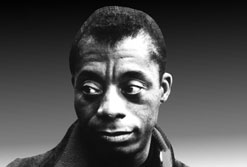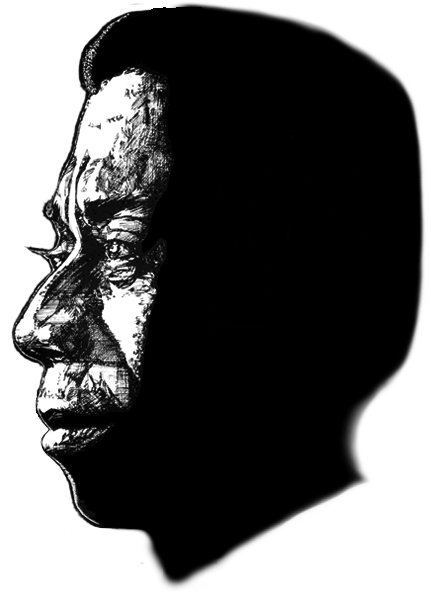| 1924: | Born August 2nd in New York's Harlem Hospital. |
1927:
| Emma Berdis Jones (Jimmy's mother) married Reverend David Baldwin (Jimmy's stepfather). Eight more children followed. |
1930's:
| Read avidly and began writing. Won numerous prizes from school, church and city for his early efforts. |
| 1938: | Began preaching at Fireside Pentecostal Assembly. |
1942:
| Graduated from DeWitt Clinton High School. Renounced the ministry. |
| 1943: | His stepfather, Reverend David Baldwin, died. |
1946:
| First book review published in The Nation, on Maxim Gorki. Won a Eugene Saxton Memorial Trust Fellowship. |
1948:
| First short story published in Commentary: "Previous Condition." Won a Rosenwald Foundation Fellowship. Made first of many trips to France (this time for a four-year stay). |
1949:
| First essay published in Partisan Review: "Everybody's Protest Novel." |
1952:
| Finished writing first novel, GO TELL IT ON THE MOUNTAIN, in Loèche-les-Bains, Switzerland. |
| 1953: | First novel, GO TELL IT ON THE MOUNTAIN, published by Knopf. |
1954:
| Won a Guggenheim Fellowship. Second novel, GIOVANNI'S ROOM, rejected by Knopf because of its subject: homosexuality. |
1955:
| First collection of essays, NOTES OF A NATIVE SON, published by Beacon. First play, THE AMEN CORNER, produced at Howard University, directed by Owen Dodson. |
1956:
| Second novel, GIOVANNI'S ROOM, published by Dial. Won award from National Institute of Arts and Letters. Began writing third novel, ANOTHER COUNTRY, in Corsica. Won Partisan Review Fellowship. |
1957:
| Made first of many trips through the South (participating in the civil rights struggle, a major preoccupation for the rest of his life). Met Martin Luther King for the first time. Began working with Elia Kazan as a playwright-in-training. |
1958:
| Second novel, GIOVANNI'S ROOM, produced as a play by the Actor's Studio, with Turkish actor Engin Cezzar in the role of Giovanni. |
| 1959: | Won a Ford Foundation grant. |
1961:
| Second collection of essays, NOBODY KNOWS MY NAME, published by Dial. Continued working on third novel, ANOTHER COUNTRY, in William Styron's guest cottage. Made first trip to Istanbul, where he finished ANOTHER COUNTRY. |
1962:
|
Third novel, ANOTHER COUNTRY, published by Dial. Made first trip to Africa. |
1963:
| Best-selling essay, THE FIRE NEXT TIME, published first by the New Yorker, then by Dial (this was the first essay in history to spend forty-one weeks among the top five of the N.Y. Times' Bestseller List). Won the George Polk Memorial Award. Historic meeting with Robert Kennedy, May 25th. Led civil rights demonstration in Paris, August 19th. Participated in March on Washington, August 28th. Made second trip to Africa. |
1964:
| Finished writing second play, BLUES FOR MISTER CHARLIE, in Istanbul. BLUES FOR MISTER CHARLIE published by Dial and produced in the Anta Theater by the Actor's Studio. Won the Foreign Drama Critics Award. NOTHING PERSONAL, a collaboration with photographer Richard Avedon, published by Atheneum. |
1965:
| First collection of short stories, GOING TO MEET THE MAN, published by Dial. Debated William F. Buckley Jr. at Cambridge University, received a two-minute standing ovation. Made first trip to Israel, with European production of THE AMEN CORNER. |
1966:
| Finished writing TELL ME HOW LONG THE TRAIN'S BEEN GONE in Rumeli Hisari, Turkey. |
1968:
| First play, THE AMEN CORNER, finally published by Doubleday. Fourth novel, TELL ME HOW LONG THE TRAIN'S BEEN GONE, published by Dial. Agreed to write screenplay of "The Autobiography of Malcolm X" for Columbia Pictures; moved first to Los Angeles, then to Palm Springs while working on the script. Worked closely with Martin Luther King, Jr., raising funds for the SCLC. Martin Luther King assassinated, April 4th. Not long after King's death, resigned the Malcolm X screenplay assignment and moved to St. Paul de Vence, France. |
1969:
| Essay on "Black Anti-Semitism and Jewish Racism" published by Barron. |
| 1970: | Directed John Herbert's play, "Fortune and Men's Eyes," in Istanbul. |
1971:
| Dialogue between Baldwin and Margaret Mead, A RAP ON RACE, published by Lippincott. Essay, "An Open Letter to My Sister, Miss Angela Davis," published in the New York Review of Books. |
1972:
| Third collection of essays, NO NAME IN THE STREET, published by Dial. First screenplay, ONE DAY WHEN I WAS LOST: A SCENARIO BASED ON 'THE AUTOBIOGRAPHY OF MALCOLM X' published first by Joseph in London, then by Dial in New York. Conversation with black poet / activist Nikki Giovanni, A DIALOGUE, published by Lippincott. Narrative collaboration with musician Ray Charles performed at the Newport Jazz Festival. |
| 1974: | Fifth novel, IF BEALE STREET COULD TALK, published by Dial. |
1976:
| Fourth collection of essays, THE DEVIL FINDS WORK, published by Dial. First children's book, a collaboration with Yoran Cazac, LITTLE MAN, LITTLE MAN: A STORY OF CHILDHOOD, published by Dial. |
1979:
| Sixth novel, JUST ABOVE MY HEAD, published by Dial. Conducted a month-long lecture series and writing workshop at the University of California in Berkeley. Made first trip to Russia, to participate in a symposium of prominent American and Soviet writers. |
1983:
| Accepted Professorship of Literature and Afro-American Studies at the Five College Network in Amherst, Massachusetts (Amherst, Smith, Mount Holyoke, Hampshire and the University of Massachusetts). |
1985:
| Collected non-fiction, THE PRICE OF THE TICKET, published by Marek/St. Martins. Essay on the Atlanta Murders, THE EVIDENCE OF THINGS NOT SEEN, published by Holt. |
1986:
| Awarded France's highest honor, La Légion D'Honneur, by President François Mitterand. Made second trip to Russia with group of prominent writers, to meet with Gorbachev and discuss world peace. |
1987:
| Died of stomach cancer in St. Paul de Vence, France. Celebrated by thousands at a funeral service in New York's Cathedral of St. John the Divine. |
. . . . . . .


